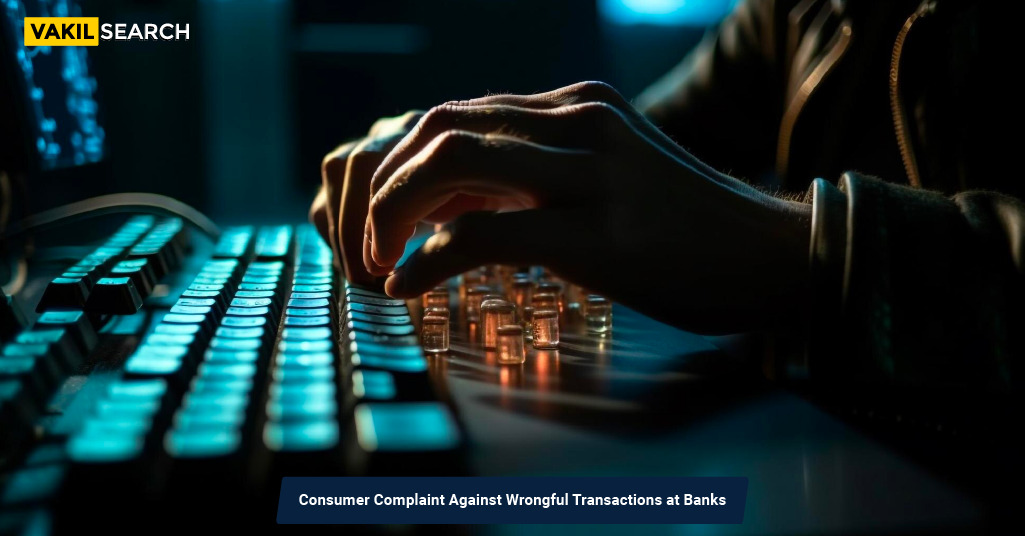Filing a consumer complaint is crucial when facing wrongful bank transactions. Explore the steps to safeguard your finances and resolve unauthorized charges through consumer protection mechanisms
Banks are the backbone of the modern financial system, entrusted with the task of safeguarding our hard-earned money. However, in the fast-paced world of finance, errors can and do occur. Wrongful transactions, whether due to human error, technical glitches, or even malicious intent, can disrupt your financial well-being and leave you feeling vulnerable. In this blog, we’ll delve into the various aspects of consumer complaint against wrongful transactions at banks.
A Multitude of Circumstances Can Lead to Erroneous Transactions:
Banking transactions are becoming increasingly complex, involving a multitude of parties, processes, and technologies. This complexity, while efficient in many cases, can also open the door to errors. Here are some common scenarios where wrongful transactions can occur:
Human Error:
Mistakes made by bank employees while processing transactions can lead to funds being sent to the wrong account or even incorrect amounts being debited or credited.
Technical Glitches:
System failures, software bugs, or network issues can result in transactions going awry. This could lead to double debits, failed transfers, or unauthorized withdrawals.
Fraud and Cybersecurity Threats:
Fraudulent activities such as identity theft, phishing, and hacking can result in unauthorized transactions, often with malicious intent. It’s essential to be vigilant and report any suspicious activity promptly.
Third-Party Errors:
Sometimes, transactions may be erroneously processed by third-party vendors or intermediaries, leading to incorrect outcomes.
Unauthorized Transactions:
Unauthorized transactions can occur when someone gains access to your account without your consent. This can be through stolen credentials, forged signatures, or other means.
How Do You Take Legal Action Against a Bank?
When you find yourself facing wrongful transactions, you have legal rights and recourse to protect your finances and seek redress. Here are the steps you can take to address the situation by filing consumer complaint against wrongful transactions
Review Your Bank Statements:
- Regularly monitor your bank statements to identify any irregularities. This can help you detect wrongful transactions early and take action promptly.
Contact Your Bank:
- As soon as you identify an erroneous transaction, get in touch with your bank’s customer service. Provide all relevant details and request an investigation into the matter.
Submit a Formal Complaint:
- If your bank does not resolve the issue to your satisfaction, consider submitting a formal complaint in writing. This complaint should outline the problem, your efforts to resolve it, and your desired outcome.
Seek Regulatory Assistance:
- If your bank still fails to address the issue, you can reach out to the relevant banking regulator or ombudsman in your country for assistance.
Legal Action:
- In extreme cases, you may need to consider legal action against the bank. Consult with a legal expert to determine the best course of action.
Check here to file legal notice under consumer protection act 2019
A Simple Approach to Getting Things Done
While the prospect of dealing with wrongful bank transactions can be daunting, following the right steps and maintaining a level-headed approach can help you achieve a resolution. Always keep detailed records of all communication with your bank and any other relevant parties. Patience and persistence are often key in ensuring that your consumer rights are protected.
In the end, the banking system is built on trust, and banks have a duty to safeguard your financial interests. By being proactive, knowledgeable, and assertive, you can ensure that wrongful transactions are rectified, and your financial security remains intact. Remember, your voice as a consumer is a powerful tool in holding banks accountable for their actions.
In conclusion, wrongful transactions can happen to anyone, but with the right approach, you can address and rectify the situation. Stay vigilant, know your rights, and don’t hesitate to take the necessary steps to protect your financial well-being. After all, your hard-earned money deserves the utmost care and attention.



